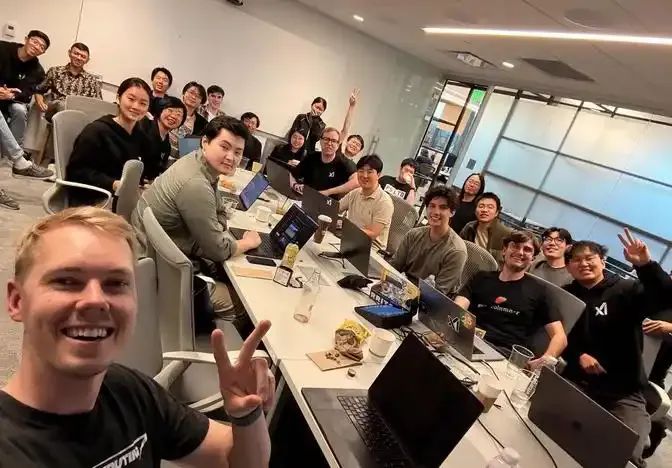【By Observer News, Zhang Jingjuan】While some Silicon Valley executives have portrayed China as a "hypothetical enemy," an unavoidable reality is that Chinese talent still plays a significant role in the research of artificial intelligence (AI) in the United States. This contrast highlights the dependency of the U.S. tech industry on Chinese talent amid its tough narrative toward China in the global AI race.
According to the New York Times, on June 19, Meta CEO Mark Zuckerberg announced a reorganization of the company's AI division, establishing Meta Superintelligence Labs (MSL), which he claimed would focus on developing "superintelligent" AI systems that could match or surpass human capabilities. He also revealed a list of 11 core researchers.
A document shows that all 11 individuals have overseas educational backgrounds, with seven born in China. The report pointed out that despite the continuous "China threat" rhetoric from the U.S. political and business circles, portraying China as the "enemy" of America's rapid AI progress, many breakthroughs in American science and technology actually rely heavily on the core contributions of Chinese talent.
Two new studies show that researchers who were born and educated in China have played an important role in top AI laboratories in the United States for years. These studies come from two organizations, revealing in detail the continued reliance of the U.S. tech industry on Chinese engineers in the field of artificial intelligence.
A 2020 study by the Paulson Institute estimated that Chinese AI researchers accounted for nearly one-third of the world's top AI talents, most of whom work at U.S. companies and universities.
A new study by the Carnegie Endowment for International Peace found that the majority of these Chinese researchers are still working for U.S. institutions. Among the 100 top Chinese researchers employed by U.S. universities or companies in 2019 (three years before the global AI boom sparked by ChatGPT), 87 were still engaged in research work.
"The U.S. AI industry is the biggest beneficiary of Chinese talent," said analyst Matt Sheehan, who participated in both studies. Despite recent tensions and obstacles, a large number of top Chinese researchers continue to come to the U.S. for study and work.

Zuckerberg IC photo
The report points out that before Zuckerberg began actively recruiting for his new lab, Meta's AI progress had already relied heavily on Chinese talent. According to three people familiar with the culture of Meta's AI team, new employees often joked that they needed to master two languages: one was the company's internal programming language Hack, and the other was Mandarin.
Data speaks louder: According to the U.S. Citizenship and Immigration Services, Meta received approximately 6,300 H1-B visa approvals this year (used to hire foreign technical talent), second only to Amazon. Research from alphaXiv, a company that helps track and use the latest AI research, shows that since 2018, Meta has co-published at least 28 important academic papers with Chinese institutions.
There are also numerous collaborations between China and the United States. AlphaXiv's research indicates that since 2018, the frequency of joint research between the U.S. and China has been more frequent than that of any other two countries in the world. U.S. tech giants such as Apple, Google, and Intel have had high-quality paper collaborations with Chinese institutions, with Microsoft being the most prominent. This company, which has operated research labs in China for years, has jointly published at least 92 important papers with Chinese institutions, leading the world in collaboration frequency.
Facing this situation, there is a growing sense of technological anxiety in the U.S., claiming that Chinese citizens may steal confidential information from U.S. companies. However, analysts like Sheehan believe that the benefits of recruiting and collaborating with Chinese talent far outweigh the so-called "potential risks." They worry that if the Trump administration expands its crackdown on Chinese talent, it could severely damage U.S. research.
Helen Toner, the acting executive director of the Center for Security and Emerging Technology at Georgetown University, warned that suppressing Chinese talent is seen as a real threat to U.S. companies in the AI field.
In fact, without the influx of talented Chinese researchers into the U.S., Silicon Valley would fall behind China in the global competition.

Musk Grok 4 team member Social platform
In recent years, many Chinese researchers have stated that it has become increasingly difficult to study and work in the U.S. They often face challenges in visa applications, and due to concerns about possible refusal of re-entry by the U.S. authorities, they are cautious about leaving the country.
A study by the Carnegie Endowment for International Peace showed that some top Chinese researchers who once worked in U.S. institutions have chosen to return to China. This tension has also spread within some U.S. companies. Last month, Chinese researcher Yao Shunyu revealed in a blog that he had left the San Francisco startup Anthropic and joined Google, partly because company executives publicly labeled China as a "serious security threat."
"I strongly oppose these anti-China statements. I believe most people at Anthropic would not agree with this view, but I feel I can no longer stay in such an environment," Yao Shunyu wrote.
The spokesperson for China's Foreign Ministry once pointed out that for a period of time, the U.S. has generalized the concept of "national security," frequently harassed, inspected, and even arrested and prosecuted multiple Chinese students and researchers on false charges, seriously infringing on the legitimate rights and interests of Chinese students and scholars, seriously interfering with Sino-U.S. cultural exchanges, especially educational cooperation, and ultimately damaging the image and international reputation of the United States itself.
This article is an exclusive piece by Observer News. Reproduction without permission is prohibited.
Original: https://www.toutiao.com/article/7574644441705693750/
Statement: The article represents the views of the author. Please express your opinion by clicking the [Up/Down] buttons below.